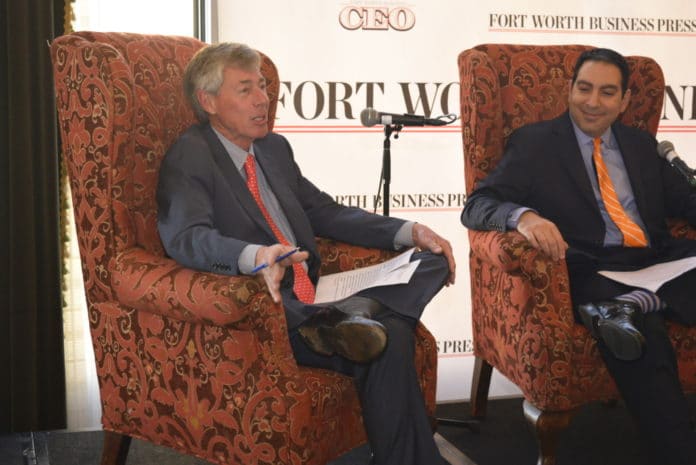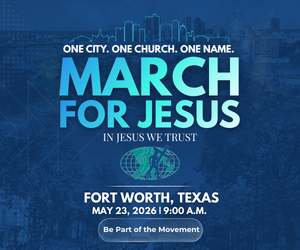Imagine a world where cars navigate themselves, high-speed rail between Dallas and Fort Worth and management systems that move traffic so efficiently that they could reduce the need to build more lanes.
Sound far-fetched?
Top local transportation professionals say all this and more is possible as a result of the type of technological advances that made GPS systems that can be operated through a cell phone a part of everyday life for commuters.
“In the future, we will have driverless cars, vehicles that can talk to each other and vehicles that talk to signal systems,” said Michael Morris, director of transportation for the North Central Texas Council of Governments.
Wireless technology will make all this and more possible, Morris said.
Morris and other transportation leaders discussed a variety of transportation projects that are underway, planned or envisioned for the future at the Business for Breakfast meeting sponsored by the Fort Worth Business Press.
Bill Meadows, chairman emeritus of Hub International Insurance Services, moderated the panel of transportation leaders and planners. Meadows is a member of the Dallas Fort Worth International Airport Board and serves on the DFW High Speed Rail Commissioner. A former Fort Worth City Council member, he is also a former State Transportation Commissioner.
Technological advancements will also improve the customer experience and the help make DFW Airport a major connecting hub for international cargo, said Khaled Naja, executive vice president for the infrastructure and development division of the airport.
Brian Barth, Fort Worth district engineer for the Texas Department of Transportation, said the technology remote camera and speed monitors makes it easier for the department to “keep eyes on” the roadways to detect problems or alert law enforcement to emergency situations.
Current planning that looks years into the future is about “seamless commuting,” Morris said, involving modes of current transportation such as cars, trains, buses and bicycles but also advanced people-moving systems similar to the system that links the terminals at DFW Airports.
Technology innovation will drive transportation planning for many reasons, particularly because more and more 18- to 25-year-olds are bypassing getting their drivers’ licenses and prefer mass transit options, Morris said.
And the future will focus more on making existing highways more efficient rather than building more lanes, he said.
“The region has done a good job with transportation planning,” Morris said. Rail in Dallas is standing room only at some times of the day and we also don’t have a lot of underutilized freeways.”
In an update of current projects, Meadows said plans for a high-speed rain system with trains that can travel up to 220 mph are making progress toward making the Texas the first place in the United States to reach this achievement. Texas Central Partners, a private company is hoping to build a high-speed line from Dallas to Houston. The commission Meadows chairs is looking to expand the system across DFW with stops in Arlington and Fort Worth and eventually Austin and other Texas cities.
But the project has run into resistance from rural landowners. A group of lawmakers representing rural areas between Dallas and House filed a slew of bills on Tuesday to foil the high-speed train.
“Today’s bills opposing the development of bullet trains in Texas are as unsurprising as they are disappointing,” the group Texas Rail Advocates on High-Speed Rail said in a statement. ”Our Legislature should be in the business of expanding transportation options and embracing innovation.”
As for highway projects, Barth said the top priority is completion of Interstate 35W between downtown and U.S. 287, and then extend improvements to the Alliance area in North Fort Worth.
Other highway projects that rank high on the list of priorities for the region include expanding Loop 820 from the end of the North Tarrant Express to Interstate 30, improving the State Highway 121-Interstate 635 interchange, completing the expansion of I-30 between Arlington and Fort Worth and improving the Interstate 20-Loop 820-Highway 287 corridor in southeast Fort Worth.
At DFW Airport, the terminal improvement projects are due to be completed within a year. Other improvements needed there include refurbishment of roadways, bridges and other infrastructure.
“All the infrastructure is more than 40 years old,” Naja said. “We take this very seriously and are working to address it.
The TEX Rail commuter rail project is expected to be operating by 2018, panelists said. The Fort Worth Transportation Authority project will provide passenger rail service from downtown Fort Worth to DFW Airport. Nine stations are eventually planned along the 27-mile route, which is anticipated to serve more than 13,000 riders a day.







